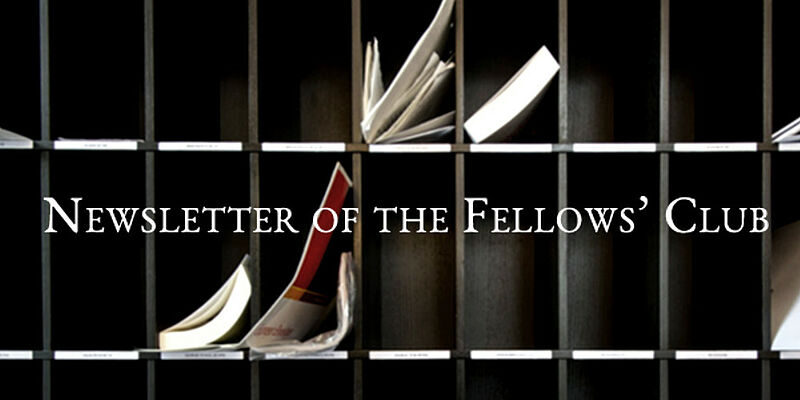
Editorial
This newsletter is appearing between the dates of two 30-year anniversaries: November 9, 2019 and October 3, 2020. Both of these are not only key dates in German history but refer to a European and global revolution which was momentous for the Wissenschaftskolleg. West Berlin ceased to be an island and Berlin now became the capital of a unified Germany, and the Wissenschaftskolleg faced the challenge of finding a new role in a united Europe.
That date of November 9, 1989 was a Thursday, which even back then was the day set aside by the Wissenschaftskolleg for its Fellow dinners. Rumors of the changes afoot penetrated to the Wissenschaftskolleg’s restaurant, so all the Fellows flocked to the clubroom television to watch the eight o’clock news and Günter Schabowski’s now famous press conference. Not even the news anchor Jo Brauner was aware of the implications of the report he was broadcasting that evening. But certain Fellows like the jurist Hasso Hofmann sensed a transition taking place, and immediately took the S-Bahn to Friedrichstraße. Others like the constitutional lawyer Ulrich K. Preuß, on the other hand, thought that it was impossible for such a complex process to transpire with any rapidity and he just went to bed. This proved to be bad judgement. Ironically – as you can read in an interview in this edition – Preuß later was all the more intensely preoccupied with the East German revolution by dint of his helping to draft a constitution for the GDR. Other Fellows in this academic year of 1988/1989 put their projects aside to devote themselves to the exciting events of the day. For instance there was the writer Friedrich Dieckmann, who recorded his experience of the fall of the Wall and its aftermath in essays and poems; or the American historian Robert Darnton who, instead of working on his cultural history of the eighteenth century, penned an account of his own experience of those political events entitled Berlin Journal, 1989-1990.
The Wissenschaftskolleg quickly developed into a thinking chamber for a coalescing Germany, into a bridgebuilder between western and eastern Europe. This manifested itself in the program of events – soon after the Wall came down, for example, there was a workshop on the privatization of the GDR economy and Willy Brandt gave a lecture on “Political Reactions to Unforeseen Historical Changes,” whose title this visionary had already conceived earlier that spring. And the invitation policy changed as well – since 1989, the institute hosted some fifty Fellows from Hungary alone, among them the writer Imre Kertész, who received the Nobel Prize in Literature during his year as a Fellow at the Wissenschaftskolleg and who was well remembered in a recent public discussion led by Wolf Lepenies. Moreover the Wissenschaftskolleg assumed the task of supporting the establishment of Institutes for Advanced Study in the former Eastern block – reporting on these initiatives is the former head of the Kolleg’s admission department, Kathrin Biegger, who was and is intensely involved in these processes.
Thirty years later many of the questions which the year 1989 prompted are still unanswered. Karolina Wigura and Jarosław Kuiz (Fellows 2019/2020) give us a Polish view of the anniversary years of 1989. Their commentary insists on the unexpected consequences of a revolution that today is perceived by many Poles as an experience of loss.
Laurenz Lütteken
in the name of the Executive Board of the Fellows’ Club